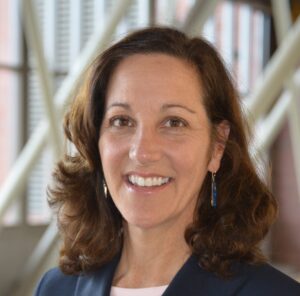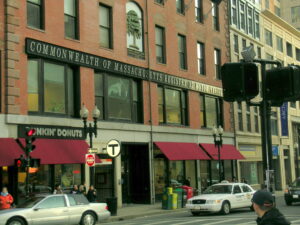By Sharon Longo
Contributing Writer

Photo/courtesy of Massachusetts Registry of Motor Vehicles
REGION – Getting your driver’s license for the first time is exciting and brings a feeling of independence. As we age, renewing that license and keeping up with the responsibilities involved with driving and having a car can become overwhelming. The Massachusetts Registry of Motor Vehicles (RMV) has helped make that task a bit easier for older drivers.
Meeting the needs of older drivers
“There have been many exciting initiatives that have taken place over the last 20 years at the RMV,” said Michele Ellicks, the RMV’s community outreach coordinator. This includes the Community Outreach Division, which has been in existence for several decades and helps meet the needs of older drivers. Some support they provide to seniors is helping them to renew a driver’s license or surrendering their current license and obtaining an ID card instead.
A cooperative program between the RMV and Massachusetts Councils on Aging (COA) is another initiative that is about six to eight years old. COAs are located throughout the state and are active in several programs. One, dubbed “RMV Near Me,” provides staff and volunteers training to assist seniors with online transactions. “Some older adults may not have access to a computer and need help with completing online transactions,” Ellicks explained.
The RMV met with a team of volunteers at the Westborough Council on Aging (COA) back in January to train them to help senior citizens. Participating cities or towns set aside a certain day, once a month or even each week, depending on the needs of the community. This is to provide one-to-one support to help seniors prepare to go to the registry, organize documents, fill out applications, or complete online transactions, saving them a trip to the facility. “The response to this has been phenomenal,” said Ellicks.
Changes since Covid

When Covid hit, the registry initiated a senior hour for adults 65 years and older, by reservation only, every Wednesday between 9:00 and 10:00 a.m. at each RMV (except for Chicopee). There is also a dedicated reservation line (857-368-8005, Monday through Friday, 9:00 a.m. – 5:00 p.m.) for those 65 and older or for persons with a disability.
In addition, any person of any age who needs to conduct transactions in person must make a reservation in advance, Monday through Friday between 9:00 a.m. and 5:00 p.m. This also helps with controlling the number of people within the facility. However, if any customers need to do a motor vehicle registration transaction, walk-ins are welcome for that purpose.
Helping others help seniors
Older adults may also benefit from the RMV’s Community Outreach workshops that take place weekly across the state at Councils on Aging. “I also speak to graduate students who are becoming Occupational Therapists (OTs) from Tufts, Boston College, and Mass General Hospital to help them work with seniors,” Ellicks explained. “Students learn about older driver characteristics, crash rates, ways to support older driver safety, and RMV policies and procedures.”
One older driver workshop that has been revamped is called “Shifting Gears,” and it provides older driver safety tips that highlight warning signs of unsafe driving. “Older drivers, aged 55 to 74, tend to put self-imposed limits on driving, which helps reduce crash rates,” said Ellicks. However, the crash rate begins to increase around age 75. “There are many age-related physical and cognitive changes that can impact driving,” she noted. “In addition, some medications may negatively impact one’s ability to drive. The workshops can help someone determine if an older person is safe to drive.”
The RMV’s Medical Affairs Division oversees competency road tests and sets policies and procedures regarding medical standards and qualifications for driver’s licenses. In addition to the RMV, many hospitals and rehabilitation centers offer professional driving evaluations.
Another great driver safety program called “Car Fit,” which was created by the American Occupational Therapy Association (AOTA), American Automobile Association (AAA), and AARP, hosts events across the US at various locations. “Older drivers drive to a Car Fit location, and OTs will look at how they’re seated in the vehicle and make recommendations to find the safest fit by adjusting the mirrors, the seat, and the steering wheel,” Ellicks explained. “These can be simple but effective changes to improve driver safety.”
She added, “Many driver’s ed schools also have instruction for older adults.” Ellicks explained how her mom had suffered a health issue. During that time, she hadn’t driven while rehabilitating. “Once my mom recovered from her illness and was told by her health care provider that she was safe to drive, she asked me if there were driving classes for older adults. I helped her book two one-hour sessions of on-road instruction with a licensed driving instructor. After the first hour, she was doing so well, the instructor assured her that her driving skills were excellent, and there was no need for the second session. It gave her the confidence she needed to get back on the road. Sometimes people just need to regain that confidence.”
Technology today
Some seniors are extremely comfortable with technology, while others might not have access and need a little extra help. “Seniors need to be familiar with in-vehicle technology,” Ellicks stated. “There are a lot of benefits, and it’s important to know how to use it. Many people would benefit from hands-on, in-vehicle technology training when buying a new car.”
She suggested that car dealerships provide instructions or training to show customers how to use the navigation system, collision avoidance systems, lane departure warning systems, cruise control, or other technological advances.
Planning for driving retirement
As people age and their ability to drive safely lessens, they need to be prepared for what comes next. Ellicks had this to say. “Statistics state that most people will live beyond their ability to drive safely,” she noted. “Women live about 10 years beyond, while men live about seven years beyond their ability to drive. It’s important for anyone with a license to plan for driving retirement and to identify what alternatives are available.”
“Your mobility can change, even temporarily,” she continued. “Identifying alternatives to driving will allow us to continue working, volunteering, caring for the grandkids, traveling, and maintaining our quality of life.” Most Councils on Aging have a transportation coordinator on staff who can help, and she mentions how hearing from one’s peers is also helpful to learn how others have retired from driving while maintaining their mobility.
As we go through any stage of life, it is helpful to have information that pertains to what we are experiencing. Driving (or no longer being able to drive) is one of these stages. The Massachusetts Registry of Motor Vehicles has many resources and links to help, and Michele Ellicks is just one of the many people who can provide the answers.
For more information, go to https://www.mass.gov/info-details/older-drivers.
RELATED CONTENT:
Refresh your driving skills in 2020 with the new AARP Smart DriverTEK course (fiftyplusadvocate.com)
Age-friendly communities are becoming more widespread (fiftyplusadvocate.com)
Massachusetts is reimagining aging in its communities (fiftyplusadvocate.com)












